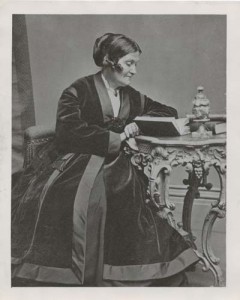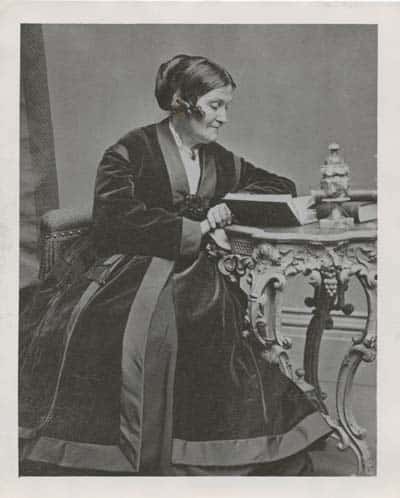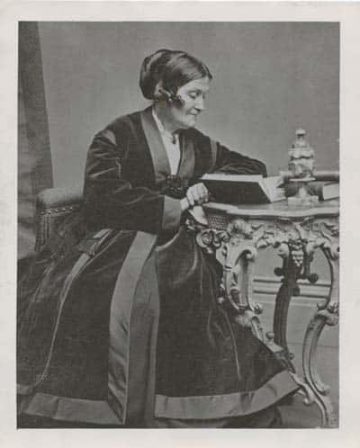The Church of Jesus Christ of Latter-day Saints (LDS/Mormons) was organized in Fayette, New York in 1830. Only seven miles away, Lucretia Mott and Elizabeth Cady Stanton organized the first Women’s Rights Convention in Seneca Falls in 1848.
Although Mott and Stanton were two of the most progressive advocates for women of their time, it did not even occur to them that they might preside over the convention they had planned. That honor went to Mott’s husband, James Mott.
In mid-nineteenth century New York, the idea that women should be permitted to speak in “promiscuous company” (a term describing mixed gender public gatherings) was extremely controversial. Women presiding over a mixed gender meeting had not even entered the realm of imagination.

That changed two weeks later when another group of New York women, inspired by the Seneca Falls Convention, decided to hold a Women’s Rights Convention in their own town of Rochester. With unprecedented boldness, they selected Abigail Bush to preside.
Shocked, Mott and Stanton opposed Bush’s appointment but soon after, they adapted to the liberating new idea that a woman could preside over a mixed gender meeting. At the Rochester Convention, Mott hugged Bush and thanked her for presiding. Stanton apologized to the Rochester women for her “foolish conduct.”
In the decades that followed, New York society came to recognize that anyone could preside over a meeting regardless of sex. Mormons, however, were no longer in New York during this shift in cultural norms. While Abigail Bush made history by presiding over the Rochester Women’s Rights Convention, Mormons were busy establishing a new settlement far away in the Rocky Mountains.
Today, the LDS Church continues to limit the privilege of presiding over mixed gender meetings to men. Even General Relief Society Meeting, which is attended by a comparatively small number of men, is presided over by men, not women. Church members may assume that there is a divine, theological reason for this peculiar custom but its roots can be easily and directly traced to the secular culture of the time and place where the church originated.
Which leads to some questions:
- Which other customs, policies and even “doctrines” of the church have secular origins in the patriarchal culture where it all began?
- What could we do differently, if change were within our realm of imagination?
Source: McMillen, Sally G. Seneca Falls and the Origins of the Women’s Rights Movement. Oxford University Press: 2008.







13 Responses
Thanks for making this connection, April. Sorry this isn’t getting to your questions, but I think you’ve hit on absolutely exactly the reason that we don’t ordain women or have women preside over groups including women and men. It seems like it’s not so much that Church leaders oppose it, it’s that they haven’t even *considered* it! They can’t even *imagine* it. They would no more think of having women preside over men than they would think of having mooses preside over men. Presiding just isn’t what women are *for* (in their minds).
Ziff, I think you very much got to my questions.
What you said reminds me of a statement on the Ordain Women website (only they are talking about women, not our male leaders):
“In many ways, our greatest obstacle to women’s ordination is a failure of imagination. As Mormon women, we can’t imagine moving beyond the space we’ve been assigned–and when that space is a much-touted pedestal, it is limiting. Women’s ordination will only enter the realm of the possible if the idea of it becomes familiar.”
http://ordainwomen.org/faq/
Thanks for pointing this out. I look forward to the day Mormons see women as fully human. Maybe that’s too harsh. I feel disappointed in the church today.
On a happier and unrelated note, I live 15 miles south of Fayette, NY and while all I the other teams in his soccer league are named after local businesses, his is named Elizabeth Cady Stanton because they ran out of sponsors. I think his coaches picked the name and it’s printed boldly across the front of his jersey.
Sorry that was messed up. I meant my son’s soccer team.
No worries Big L. It is all kinds of awesome that Elizabeth Cady Stanton posthumously sponsors your child’s soccer team.
Yes! This is awesome!
This is absolutely brilliant, April. I suspect there are numberless polices and doctrines that are blanketed with cultural biases. Not just here in the US, but worldwide. For instance: I believe there is no doctrinal foundation for males/deacons passing the sacrament. 12-year-old young women could start doing that tomorrow. Imagination-R-Us! I love this post.
Bravo! I love this post.
This reminds me of the “Let Women Pray” campaign.
Everyone was shocked that women haven’t been praying the entire time.
Now we can be shocked that women have been presiding (outside of Mormonism) since 1848.
Ca me fait penser à un truc: je voulais partager un de tes/vos (un coup je tutoie un autre je vouvoie- que préférez-vous?) articles sur mon blog (celui sur le manuel de l’aide-malade et de l&ofeur;insirmièrq) mais il n’a pas réapparu! (Il reste cité mais pas de lien vers l’article).
Interesting post. In light of this, I went back and read the RS minutes from when the RS was formed because my recollection was that the women ran and presided in those meetings exclusively and any men present had to ask permission to speak.
Upon closer read, the men opened the meeting, then they would leave and wait in the next room until they were called back in to participate or until the meeting was done, and they were invited back in to close the meeting.
Without exception, any time a man came into an early RS meeting, he was given the default presiding role. Women were only allowed to run their own meetings after the men excused themselves (which they did in almost every meeting).
Thanks for looking into that NateCC! That is fascinating.
Thanks for sharing the historical perspective. It’s enlightening to know where these traditions come from.
[…] Many other Mormon men do not behave this way, so the Church could not have been the only factor that made this particular date the male chauvinist he was. However, Church culture and policy certainly did their part to help this guy’s male chauvinist attitudes to thrive. While LDS rhetoric about men presiding at home has softened over the years, LDS authorities continue to teach that men preside in the home. The inclusion of this rhetoric in the Proclamation on the Family makes it more official. LDS policies requiring men to preside over women are easily traced to the secular culture of the time and place where the church began. […]